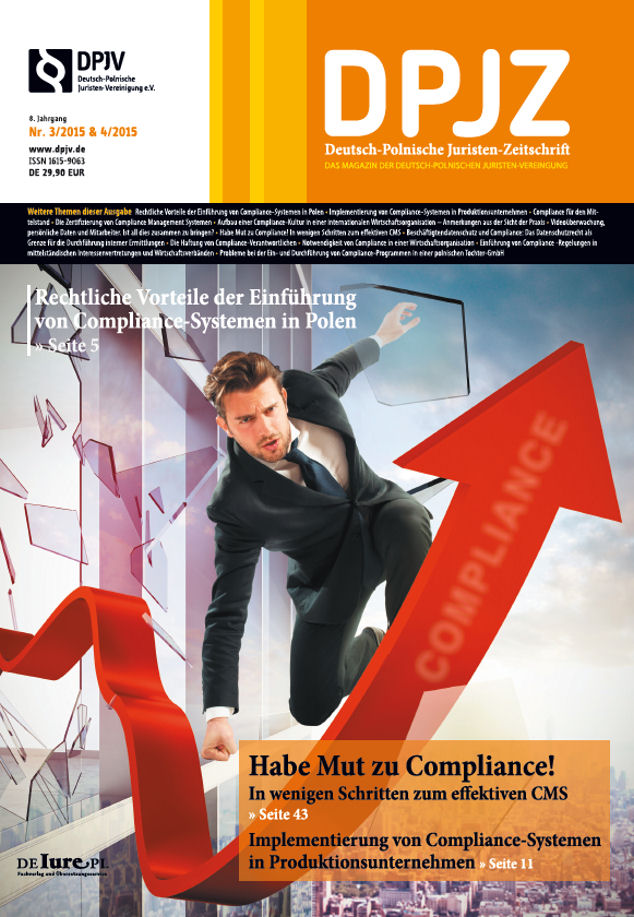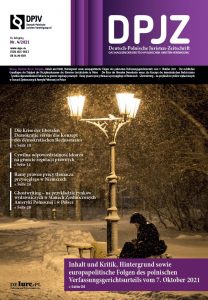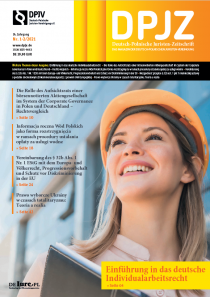Inhaltsverzeichnis:
- „Rechtliche Vorteile der Einführung von Compliance-Systemen in Polen“ von Marcin Ciemiński und Monika Diehl,
- „Implementierung von Compliance-Systemen in Produktionsunternehmen“ von Oskar Filipowski,
- „Compliance für den Mittelstand“ von Peter Fissenewert ,
- „Die Zertifizierung von Compliance Management Systemen“ von Magdalena Gertig und Bartosz Jagura,
- „Aufbau einer Compliance-Kultur in einer internationalen Wirtschaftsorganisation – Anmerkungen aus der Sicht der Praxis“ von Piotr Janecki,
- „Videoüberwachung, persönliche Daten und Mitarbeiter. Ist all dies zusammen zu bringen?“ von Dominik Lubasz, Witold Chomiczewski, Wojciech Szlawski
Streszczenia / Summaries
dr Marcin Cieminski, Monika Diehl
Prawne korzysci wprowadzenia systemu compliance w Polsce / Rechtliche Vorteile der Einführung von Compliance-Systemen in Polen
Legal benefits of introducing the compliance management system in Poland
The article concerns the legal benefits which are achieved by introducing a compliance management system in a company operating in Poland. The article discusses how the adoption of a tailored compliance system helps the company to prevent and identify irregularities, assists with damage control, and enables the appropriate action to be taken in cases of non-compliance. The article also focuses on the presence of a compliance defense in the Polish Corporate Criminal Liability Act.
dr Oskar Filipowski
Wdrazanie systemu Compliance w przedsiebiorstwach produkcyjnych / Implementierung von Compliance-Systemen in Produktionsunternehmen
Abstract: The aim of this article is to give couple of practical hints on building compliance management systems in companies operating in Poland. The Author presents the definition of compliance management systems, its scope and main steps that ensure building of “tailor-made” compliance function in the company as well as legal threats connected with this process. As the conclusion, Author presents his view that compliance management system has to take into consideration many factors such as jurisdictions, where the company operates, its size and industry branch, therefore it is impossible to copy systems from other companies as they will not fit the needs of the organization.
Zusammenfassung
Die vorangegangene Aufarbeitung veranschaulicht, dass die Einrichtung eines CMS in jedem Unternehmen im Hinblick auf dessen Größe, Branche und Einordnung unter die Rechtsprechung des Geschäftsortes erfolgen sollte. Ein CMS bezweckt die Ausschaltung von Rechtsverstößen und Zuwiderhandlungen gegen freiwillig aufgenommene Verpflichtungen sowie die Gewährleistung von deren Einhaltung in sensiblen Geschäftsbereichen des Unternehmens. Aus diesem Grund sollten die Struktur des CMS, die ihm gewidmeten Ressourcen sowie die Platzierung in der Organisation diesem Ziel untergeordnet werden. Es ist gleichwohl darauf zu achten, dass die gewählte Form des CMS und seine Grundsätze nicht gleichzeitig zu Verstößen in anderen Bereichen (z.B. beim Datenschutz) führen.
Peter Fliesenwert
Kontakt: Peter.Fissenewert@hww.eu
Compliance dla przedsiebiorstw sredniej wielkosci / Compliance für den Mittelstand
Übertriebener Kontrolleifer lähmt Betriebsklima und Geschäftsalltag, mangelnde Kontrolle zerstört oftmals durch Haftungsfälle schlagartig die mühsame Arbeit von Jahren. Ohne die Installation eines Compliance-Systems gibt es unzählige Risikofelder in den meisten Unternehmen. Der Mittelstand in Deutschland trifft auf 2.197 Bundesgesetze mit 46.777 Einzelvorschriften und 3.131 Verordnungen mit 39.197 Einzelvorschriften. Hinzukommen Landesgesetze und Regelungen der Europäischen Union. Insgesamt binden derzeit einen Deutschen ca. 150.000 Einzelvorschriften und dabei sind natürlich Gerichtsurteile und ausländische Gesetzgebungen, wie bespielsweise Europäisches oder US-amerikanisches Recht noch gar nicht mitgerechnet. Damit die grundlegenden Compliance-Ziele erreicht werden können, ist es wichtig, dass der CMS-Ansatz zum jeweiligen Unternehmen passt und in dessen vorhandene Strukturen und Prozesse integriert werden kann. Es sind also solche Strukturen einzurichten, von denen erwartet werden kann, dass sie für den spezifischen Unternehmenstyp zielführend sind. Für den Mittelstand eignet sich am ehesten ein dem Risiko und der Größe angepasster, wesensgemäß eher schlanker Ansatz, der sich auf die wesentlichen Aufgaben des CMS konzentiert. Das besondere eines solchen Ansatzes ist dabei nicht, dass er andere Themen behandelt als Ansätze, die auch in Großunternehmen angewandt werden. Dies würde eher verwundern, da jedes Unternehmen, das mit Menschen zu tun hat, den vielfältigen Gefahren ausgesetzt ist, die von deren möglichen Fehlverhalten ausgehen. Die Besonderheit eines mittelständisch orientieren Ansatzes ist vielmehr die Herangehensweise an Compliance-Themen. Es geht also konkret darum, wie Themen angegangen und Maßnahmen effektiv umgesetzt werden. Ziel des Ansatzes ist es, dass der Kern der wesentlichen Compliance-Aufgaben für Unternehmen schnell erfassbar ist, da sie dann eher bereit sind, sich diesen Aufgaben zu stellen.
Magdalena Gertig, LL.B.; Bartosz Jagura, LL.M.
Certyfikacja systemów zarzadzania compliance / Die Zertifizierung von Compliance Management Systemen
The article examines objectives and a scope of application of the German Assurance Standard “Principles for the Proper Performance of Reasonable Assurance Engagements Relating to Compliance Management Systems” (AssS 980) and the international standard for compliance management systems ISO 19600. The two authors analyse the benefits from certification of compliance management systems in regard to effectiveness and efficiency according to the AssS 980, as well as benefits from implementation and development of compliance management systems according to the ISO 19600. Furthermore the article explores the possibility that ISO 19600 will be the basis for an accepted assurance standard in the near future.
Der Themenkomplex der CMS-Zertifizierung gewinnt in Deutschland zunehmend an Bedeutung, nicht zuletzt vor dem Hintergrund der verschärften Verantwortung von Organmitgliedern von Kapitalgesellschaften. Das Vorweisen eines firmeneigenen CMS stellt zwar keinen pauschalen Umstand zur Befreiung von rechtlicher Verantwortung dar (die Gerichte beurteilen jeden Fall individuell), liefert jedoch zweifellos ein Indiz dafür, dass der Vorstand bei der Führung der Geschäfte der Gesellschaft die gebotene Sorgfalt eingehalten hat. Bis jetzt ist in der deutschen Rechtsprechung noch keine Entscheidung darüber ergangen, welchen Einfluss die Durchführung einer CMS-Zertifizierung auf eine mögliche Verantwortungsbefreiung haben könnte.
Eine CMS-Zertifizierung weist eine Reihe von Vorteilen auf. Sie ermöglicht eine Durchleuchtung des eigenen CMS durch externe Wirtschaftsprüfer ohne Verbindungen zur Organisation und daher mit einer Unbefangenheit, die es erlaubt, vom Compliance Officer übersehene Lücken zu schließen. Die Durchführung einer Zertifizierung gewährleistet, dass bei der Gestaltung eines CMS höchste Standards eingehalten und das System effektiv umgesetzt worden ist. Die Kehrseite einer Zertifizierung bilden ihre Kosten sowie die fehlende Gewährleistung für eine Befreiung von rechtlicher Verantwortung im Falle einer Aufdeckung von Compliance-Verstößen.
Piotr Janecki
Tworzenie kultury compliance w organizacji miedzynarodowej – uwagi praktyczne / Aufbau einer Compliance-Kultur in einer internationalen Wirtschaftsorganisation – Anmerkungen aus der Sicht der Praxis
How to develop a compliance culture within international organization-few practical remarks
If You would like to develop a decent compliance culture within the global organization You have to organize Your work in a appropriate way. Very important is to have a pragmatic approach and organize Your approach in a efficient way. Development is a stage based process which should be divided into right phases. Author of this article will share his idea regarding possible pragmatic approach divided into 4 steps (stages). Stage number one would be definitions and regulations. Before compliance will became a habit, its main assumptions should be clearly defined and published in a right way.
Form and the shape of the regulation should be adopted to the needs of the organization. If it is a Liability Company, Managing board should publish it in a form of the internal regulation valid for all employees, examples of the possible ways of how to do it will be presented in the first part of this article.
Part number two would be an answer to the question how to ensure that the compliance rules defined on the first stage will be efficient and effective? This is a goal for the specialized compliance structure which are a sine qua non for system of effective compliance. Only with right people and proper compliance structure there will be a chance to go live with the standards described on stage number one. One additional thins is a strong empowerment granted by the management for the compliance functions. Worth mentioning are also the values – only value based change will go one independently of the organizational changes and fluctuation of the employees. How to ensure that this will be done-some practical advices are described in the second part of the article.
When the definitions are clear and the right people are in place, all the activities planned within the compliance area should be adopted to the real risks and needs of the organization. It means that the Compliance office should understand the processes and has to learned by heart the business he suppose to take care of. It requires proactivity and professional knowledge – proper planning of the compliance related activities requires the deep knowledge about the business we support – that’s the main idea behind 3rd part of the article. Author thinks that effective might be only system which is constantly being developed – Author thinks that as far as compliance is concerned Deming cycle – Plan Do Check and Approach is the only possible one. Continuous Improvement is the most important aspect on the way to really effective compliance – which is the clear statement described in the 4th part of the article.
Dr Dominik Lubasz, Witold Chomiczewski LL.M., Wojciech Szlawski
Monitoring wizyjny, dane osobowe i pracownicy. Czy da to sie pogodzic?
Videoüberwachung, persönliche Daten und Mitarbeiter. Ist all dies zusammen zu bringen?
Abstract
The use of monitoring, including video-surveillance may seem like an ideal solution to a number of problems connected with the provision of direct, convenient and efficient oversight of what is happening in the workplace, particularly oversight of the way and the quality of work performed by the employees. Monitoring can simultaneously serve and enable the implementation of a number of tasks and roles of compliance, in particular the preventive, probative or organizational one. At the same time the use of monitoring in the workplace is very controversial, mainly due to the lack of the legal regulations in that field. It should be noticed that the use of monitoring for compliance purposes may exceed the limits of so-called „good compliance“ and start serious number of failures leading to the worst-case. In this context, the question whether the execution of the compliance roles, in particular: preventive and probative one, may justify the use of monitoring including video surveillance and what are the basis on which it can be done. It should be taken into account that in certain circumstances data collected by video surveillance systems can be regarded as personal data and, thus, data protection rules would be applied to such data.
Prof. Dr. Bartosz Makowicz
Stawiajmy odwaznie na compliance! Kilka kroków do skutecznego systemu zarzadzania compliance / Habe Mut zu Compliance! In wenigen Schritten zum effektiven CMS.
The article presents the recent development of compliance in Germany and Poland as well as the methods of effective shaping of compliance systems, based on the ISO 19600 standard. The author indicates that the implementation of a Compliance Management System (CMS) is not always associated with high costs, therefore it should be ubiquitous not only among large corporations, but small and medium-sized enterprises as well. An analysis of the principles of CMS shaping is carried out: proportionality, flexibility, transparency, long-term compliance culture. Additionally, the article points out the individual steps of CMS implementation.
Rozwój idei compliance, która przyjela sie w Niemczech w znacznym stopniu, w Polsce przebiega wprawdzie znacznie wolniej, lecz znajduje wsparcie w dzialaniach promocyjnych urzedów. Powyzsze rozwazania pokazuja, ze polskie przedsiebiorstwa nie musza zywic obaw, zwlaszcza odnosnie kosztów implementacji CMS, i ze, w obliczu rozlicznych korzysci plynacych z compliance, warto zastanowic sie nad wykonaniem pierwszego kroku w tym kierunku. Jest to w szczególnosci sposób na zademonstrowanie zagranicznemu partnerowi umiejetnosci nadazania za rozwojem globalnego rynku oraz tego, ze jako bezpiecznemu i pewnemu partnerowi mozna nam zaufac. Compliance moze wiec stanowic pozytywny bodziec dla rozwoju calej polskiej gospodarki i tym samym rodzic korzysci równiez dla spoleczenstwa.
Stephan Pötters
Ochrona danych osobowych pracowników wobec systemu compliance:
Prawo ochrony danych osobowych jako granica dla wewnetrznych dochodzen / Beschäftigtendatenschutz und Compliance: Das Datenschutzrecht als Grenze für die Durchführung interner Ermittlungen
If the management of a company has reason to suspect criminal activities or a breach of other important legal provisions, it is their duty to thoroughly investigate the case. The necessary internal investigations usually imply the processing of the employees‘ personal data. Hence, compliance requires to strike a balance between the need for effective investigations on the one hand and the respect for the employees‘ privacy rights on the other hand. This implies a proportionality test. The following article adresses those conflicts and develops a methodology for the proportionality test.
Dr. Jan Schürmann,
Odpowiedzialnosc prawna pracowników odpowiadajacych za compliance / Die Haftung von Compliance-Verantwortlichen
Powyzsza analiza pokazuje, ze osoba odpowiadajaca w przedsiebiorstwie za compliance musi szczególowo i bardzo uwaznie ocenic czyhajace na nia ryzyko osobistej odpowiedzialnosci prawnej. Jezeli pelnomocnik ds. compliance slusznie mógl uwazac zarzucane mu dzialanie na szkode pracodawcy za konieczne, moze przyslugiwac mu przeciwko przelozonemu roszczenie umowne o poniesienie kosztów reprezentacji procesowej. Pozostaje ono jednakze ograniczone do przypadków umyslnego naruszenia przez pelnomocnika ds. compliance jego prawnych obowiazków. Warto, aby osoba pelniaca te funkcje zostala przez firme ubezpieczona od kosztów zwiazanych z ochrona interesów prawnych. Pasywna ochrona interesów prawnych zawarta jest równiez w pakietach D&O, w ramach których ubezpieczyciel bierze nawet na siebie koszty odpowiedzialnosci cywilnej. Nalezy jednak pamietac, ze w obu przypadkach ubezpieczyc mozna sie wylacznie od odpowiedzialnosci za skutki niedbalstwa. Ubezpieczyciel odmówi natomiast wyplaty swiadczenia w razie stwierdzenia umyslnego popelnienia czynu zabronionego, co zdarza sie niestety w wiekszosci przypadków popelnienia przedstawionych powyzej przestepstw. Z tego wzgledu zawsze warto w pierwszej kolejnosci polegac na wlasnej ostroznosci, a dopiero gdy ta zawiedzie – na ochronie zapewnionej w ramach ubezpieczenia.
Personal Liability Of Compliance Oficer
The article shows the risks of personal liability of compliance oficer. Regarding to criminal, labour and civil law liability it stays clear, that the personal risk fort he compliance oficer is as more growing, as he takes legal risks from the company. A special legal problem can be the duty to make a note to public authorities for law violations out of the company, committed by other employees. The article shows also, that a D&O-insurance can take some risks from the comliance oficer, but not for violation of rights through wilful intent.
Thomas Urbanczyk
Niezbednosc compliance w organizacji gospodarczej /Notwendigkeit von Compliance in einer Wirtschaftsorganisation
The ongoing importance of Compliance is noticeable. In Germany you confront it anywhere – in the newspapers or in any other media. Many enterprises, big companies in particular, commenced working on Compliance two years ago, and managed to develop adequate measures and risk-avoidance mechanisms. In Poland and among Polish entrepreneurs the awareness about Compliance broadened significantly in the last few years. Similar to Germany, the risks of ignoring Compliance measures are becoming more often recognised, however sometimes disregarded. The economies of Poland and Germany are closely related, and the role of investment is as vitally important as the mutual trade exchange. The ongoing importance of Compliance for a strongly export-oriented German economy with its companies actively present in Poland, and the accelerating optimistic expansion of Polish enterprises in Germany, were the reasons for which the Polish-German Chamber of Industry and Commerce decided to go into the issue of Compliance.
Kodeks Postepowania polskiej AHK ustala wiazace ramy dla dzialalnosci Izby i definiuje, czym powinno byc etyczne zachowanie w przypadku pracowników, czlonków organów oraz pelnomocników. W Kodeksie zarzad AHK zobowiazal sie do opracowania i wprowadzenia odpowiedniego programu compliance. Zawiera sie w tym zwlaszcza mianowanie oficera compliance, implementacja centralnej regulacji, przeprowadzenie szkolen oraz regularna kontrola aktywnosci na rzecz compliance i stworzenie mozliwosci doinformowania sie pracowników i zgloszenia przez nich podejrzenia o naruszenie Kodeksu Postepowania tudziez przepisów prawa.
Przyjmujac wytyczne zawarte w Kodeksie Postepowania jako punkt wyjsciowy i opierajac sie na wynikach analizy ryzyka dla compliance, uchwalone zostac maja wewnetrzne dyrektywy zmierzajace do zapewnienia zgodnosci dzialan AHK z prawem i ze zobowiazaniami. Glówna uwaga skupi sie w nich na regulacjach dotacji, sponsoringu, ochronie danych osobowych oraz zagadnien z zakresu prawa antymonopolowego. Celem tych przepisów jest znalezienie odpowiedniej równowagi miedzy materia wymagajaca unormowania a uniknieciem nadmiernej biurokratyzacji i zbednej regulacji.
Dr. Dominik Wagner, LL.M.
Einführung von Compliance-Regelungen in mittelständischen Interessenvertretungen und Wirtschaftsverbänden / Implementacja regulacji compliance w zwiazkach interesów i zrzeszeniach przedsiebiorców sredniej wielkosci
The introduction of compliance regulations in medium-sized business associations
The introduction of compliance regulations in medium-sized business associations reserves for several years no longer exclusively for the corporate practice, but is increasingly relevant for interest groups. One of the main reasons for this development is the antitrust law, in particular because of the strict practice of antitrust fines by the German Federal Cartel Office. In addition, other areas such as anti-corruption and data protection constitute typical compliance areas. Lust but not least is reputation protection. Prior to the introduction of a compliance system and associated regulations an association-specific risk analysis must be carried out, which allows adapting the measures really necessary. Many medium-sized organizations already now have their own compliance regulations. Taking into account the recent development, it is very likely that other organizations will follow suit with their own compliance regulations and compliance systems in association business sector will become generally more complex.
Wraz z rosnaca wielkoscia i profesjonalizacja zrzeszen uczestników obrotu gospodarczego, coraz bardziej zlozonymi powiazaniami prawa i gospodarki, jak i stalym lub wrecz rosnacym ryzykiem odpowiedzialnosci odszkodowawczej zrzeszen, ich organów, pracowników i czlonków zyskiwac na znaczeniu beda równiez zwiazane z tym kwestie compliance. Wiele zwiazków przedsiebiorstw sredniej wielkosci juz dzisiaj dysponuje regulami lub dyrektywami postepowania lub wrecz podrecznikami compliance. Czynia to nie tylko ze wzgledu na korzystny wplyw na autoprezentacje, ale równiez z przyczyn minimalizacji ryzyka aktualizacji obowiazków odszkodowawczych. Przy uwzglednieniu obecnego rozwoju wydaje sie bardzo prawdopodobne, ze kolejne zrzeszenia postaraja sie o wlasna regulacje compliance i ze na niwie federacji systemy te beda coraz czesciej wielowarstwowe.
dr Joanna Schubel
Julita Zimoch-Tucholka
Problemy implementacji Compliance w polskiej spólce zaleznej z o.o. na tle Kodeksu spólek handlowych / Probleme bei der Ein- und Durchführung von Compliance-Programmen in einer polnischen Tochter-GmbH
Powyzsza krótka konfrontacja norm polskiego prawa spólek z praktyka Compliance pokazuje, ze brak jest w polskim prawie instrumentów wspomagajacych implementacje Compliance w koncernie. Utrudnia to spólce dominujacej zapewnienie wlasciwego dzialania CMS w calej grupie. Stawia takze w trudnej sytuacji zarzady spólek zaleznych, które z jednej strony musza wykonywac przyjete w koncernie zasady Compliance, z drugiej jednak strony ponosza ryzyko odpowiedzialnosci odszkodowawczej wobec wlasnej spólki. Nalezy w zwiazku z tym postulowac, aby polski ustawodawca wyprowadzil raportowanie Compliance w koncernie z „szarej strefy”. Warto w tym miejscu przypomniec o projekcie nowelizacji ksh, jaki w 2010 r. przygotowala Komisja Kodyfikacyjna Prawa Cywilnego. Projekt ten dotyczyl zmiany prawa grup spólek i przewidywal dla spólki dominujacej m. in. prawo do zadania od spólki zaleznej informacji (art. 21 § 1 projektu). Taka regulacja niewatpliwie ulatwilaby raportowanie Compliance w koncernie. Pomysl ten pokazuje takze, ze polski ustawodawca zdaje sobie sprawe z problemów, z jakimi sie zwiazane jest – powszechne przeciez w praktyce – raportowanie przez spólki zalezne bezposrednio do centrali. Prace nad wspomnianym projektem zostaly jednakze – z róznych przyczyn, których nie miejsce tu analizowac – zawieszone w 2011 r. Na razie wiec pozostaje korzystanie ze skromnego „instrumentarium” ksh przy tworzeniu kanalów raportowania Compliance.
Diese kurze Gegenüberstellung der Regelungen des polnischen Gesellschaftsrechts und wichtiger Aspekte der Compliance-Praxis macht deutlich, dass es der polnischen Rechtsordnung an Instrumenten zur Unterstützung von konzernweiten Compliance-Programmen fehlt. Dieser Umstand erschwert der Konzernspitze die Ein- und Durchführung eines gruppenweiten CMS. Genauso versetzt er Vorstände der polnischen Tochtergesellschaften in eine oftmals heikle Lage, da sie einerseits die im Konzern geltenden Compliance-Regeln zu erfüllen haben, andererseits jedoch keineswegs in den Genuss einer angemessenen Haftungsbefreiung gegenüber der von ihnen geführten Gesellschaft kommen. Es wäre demnach zu begrüßen, wenn sich der polnische Gesetzgeber zu einer klaren Regelung der Compliance-Berichterstattung entschließen könnte. An dieser Stelle lohnt ein Blick zurück ins Jahr 2010, als die Kodifikationskommission des Zivilrechts den Entwurf für eine Novelle des polnischen Konzernrechts vorgestellt hat. Die Konzernleitung sollte dabei u. a. durch ein Recht der herrschenden Gesellschaft erleichtert werden, Informationen von den abhängigen Gesellschaften verlangen zu können. Eine solche Regelung hätte auch die Zulässigkeit einer Informationsweitergabe im Rahmen von konzernweiten Compliance-Programmen geklärt. Mit diesem Vorschlag zeigte der polnische Gesetzgeber, dass er sich der Problematik der – zweifellos allgemein praktizierten – Berichterstattung von der Tochtergesellschaft an die Konzernspitze unterdessen bewusst ist. Aus verschiedenen Gründen, auf die an dieser Stelle nicht weiter eingegangen werden kann, wurden allerdings 2011 die Arbeiten an diesem Kommissionsentwurf eingestellt. Es bleibt daher bisweilen keine andere Wahl, als bei der Schaffung von Kommunikationskanälen zur Compliance-Berichterstattung auf das bescheidene „Instrumentarium” des polnischen KSH in seiner aktuellen Fassung zurückzugreifen.



